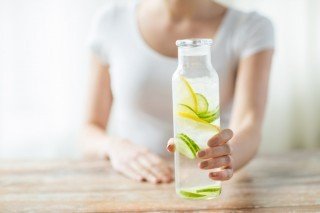Appetite on holiday? We love the holidays and time away. As good as holidays are for us for de-stressing, they can also always seem to bring out the worst of our habits. We give our appetite free rein and relax just a little too much when it comes to how we eat. It’s so much easier to justify having that second glass of wine or an extra slice of cake – because we have something to celebrate!
However, we are able to break all bad habits. We can replace them with good ones. With a few tips for adjustment, you can enjoy yourself, maintain your hard work and avoid having to go through all the usual damage control once you get back home.
1. Don’t forget to hydrate

This simple trick is probably one of the oldest ones in the book, but it’s listed here for a reason. Often when people experience hunger pangs, they are thirsty. As a result, your body doesn’t get what it really needs – and you tend to overeat. One study, published in the Journal of Natural Science, Biology and Medicine, discovered the profound effects of water when it comes to managing appetite. In the study, 50 women were asked to drink about 17 fl.oz 30 minutes before having breakfast, lunch, and dinner. Eight weeks into the study, all the women reported losing weight and having a decreased appetite.
If you struggle to drink the amount of water your body needs, make things easier for yourself. There are lots of food types that are incredibly high in water, and they can help bring your levels to where they should be. In fact, the Institute of Medicines suggests that we can get a percentage of our daily water intake from foods like cucumber, tomatoes, green peppers, watermelon, and grapefruit.
2. Choose your drinks wisely for appetite control

Alcohol is one of the biggest culprits when it comes to overindulging over the holidays. Sugary cocktails, craft gin, spritzers, and glasses of wine that somehow keep refilling – they all seem to magically show up any time we relax. Most of the time, it doesn’t do us any good, and the majority of alcohol has no health benefits. You are also much more likely to have a bigger appetite when you’ve been drinking. That’s because alcohol causes us to be less inhibited, and therefore more likely to say yes to hundreds of empty calories.
So how can you enjoy your drink without having to deal with a headache the next morning, not to mention those pesky extra pounds when the holidays end?
First, you need to be a bit pickier about what you drink. Anything that has a lot of sugar is not going to do your waistline or skin any favors. Red wine (preferably without sulfites), neat gin, and vodka are your safest bets, as they contain the least sugar and calories. Also, red wine contains resveratrol, which contains high amounts of antioxidants. Torey Armul, RD and a spokesperson for the Academy of Nutrition and Dietetics gave WeightWatchers Reimagined the low-down on the worst types of drinks. The verdict: stay away from the most mixed drinks – your cocktails, mai tais, Long Island ice teas, piña coladas, and strawberry daiquiris are all extremely high in sugar and empty calories. “Mai tais have cream de almond, triple sec, syrup, and juice in them. A small glass comes to about 300 calories,” explains Armul.
Avoid the fishbowl – stick to one small glass instead. This way, you are more likely to drink slower, and be more aware of what you’re drinking. This brings us to our next point.
3. Be mindful and savor what you decide to put into your mouth

Mindfulness has been a buzzword for several months now, and we keep finding new ways to apply this practice. One of the most effective ways to do this is when it comes to how you eat – and currently, we’re not doing this right. A report from the US Department of Agriculture states that the average American eats about 2.5 hours a day. While being glued to the screen, reading, working, and driving, According to Dr. Lilian Cheung, a nutritionist and lecturer at Harvard T.C. Chan School of Public Health, this form of mindless eating is potentially contributing to the national obesity epidemic and other health issues.
So how can one eat mindfully and control your appetite?
Dr. Cheung shared a list of ways that will help you do both.
- Buy mindfully. While shopping, consider the freshness and nutritional value of what you choose to fill your cart with and avoid the aisles containing processed foods.
- Be hungry but not starving when you come to the table. You need to be able to enjoy your food, so it won’t do you any good if you’re just aiming to get something in your stomach.
- Begin your meal with a small portion. This will also help to draw out the meal. Remember, your stomach requires about 20 minutes to register what you’ve eaten. Take your time.
- Focus on your meal and the people you share it with. Before you bring your first bite or sip to your mouth, become still for a moment and appreciate the nourishment in front of you, as well as the people that brought the meal together. Experience and express gratitude. Now you can dig in.
- Use all your senses. Being mindful means you’re eating with attention. So observe and experience the colors, tastes, textures, and scents that comprise the meal.
- Avoid too much hay on your pitchfork. When your mouth is too full, you’ll have trouble sensing the taste. Focus on taking smaller bites.
- Don’t chew too fast. Take your time, and chew thoroughly.
- As much as you can, avoid eating on the run. The way we eat today is the exact opposite of what it should be – food in hand, bolted down more for energy than experience. To really eat mindfully, you need to slow down, sit down and place your focus on your meal for 20 minutes. Then you’ll know you’ve eaten well.
Exercise and appetite control
Finally, don’t forget to stay active. It’s easy to be a couch potato on holiday. Keep moving. Do things with your family, go on walks, try to stay fuelled throughout the day. Because if you don’t, you’re going to overeat at dinner because the food is so good.
If you’re going to be on the beach, there are plenty of effective beach exercises that you can do. These include walking lunges, towel dust, and beach crawls.



![women [longevity live]](https://longevitylive.com/wp-content/uploads/2020/01/photo-of-women-walking-down-the-street-1116984-100x100.jpg)










